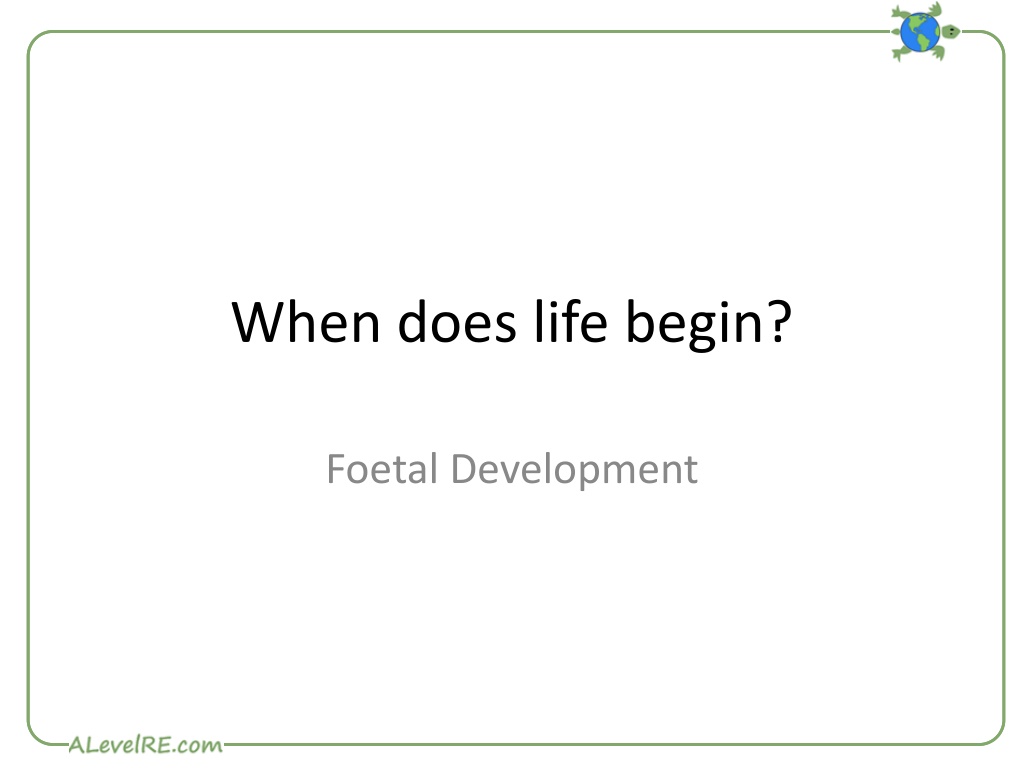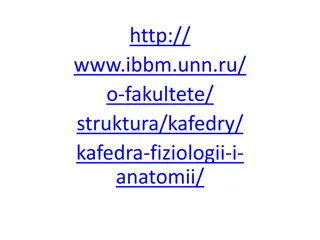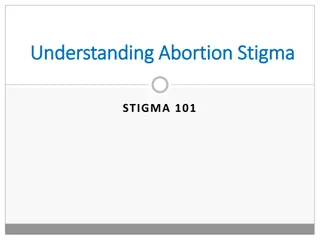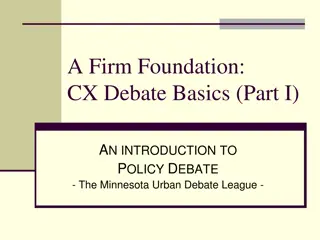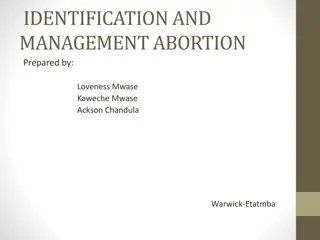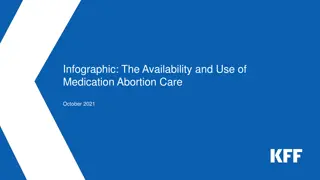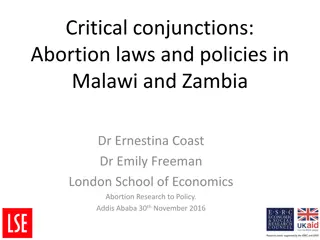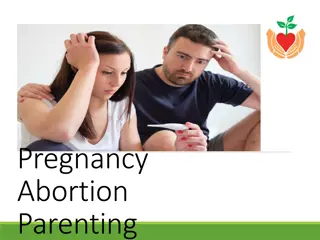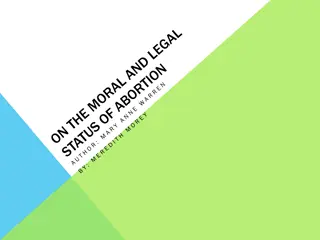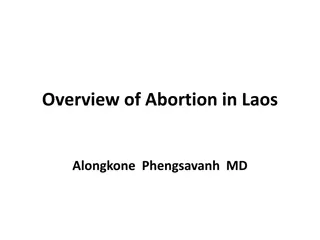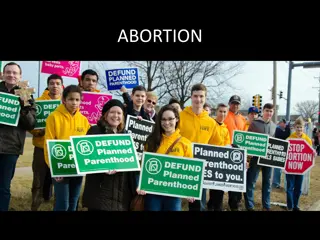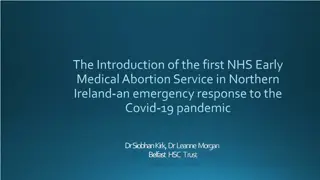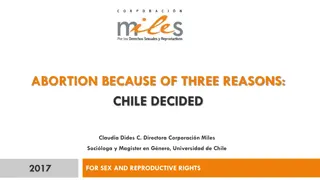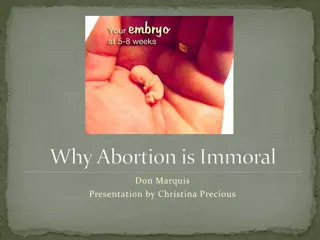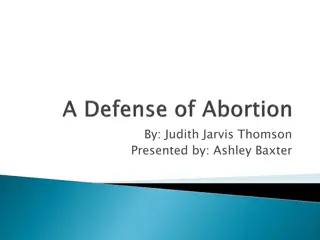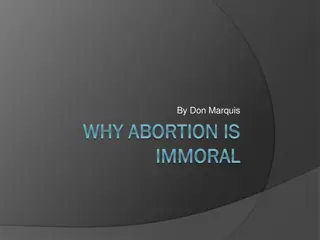Understanding when Life Begins: Key Points in the Abortion Debate
Identifying when life begins is essential in the abortion debate. The concept of life is complex, involving milestones like fertilization, heartbeat, sentience, viability, and birth. Various ethical and moral considerations influence our perspective on the beginning of life, highlighting the nuanced nature of this contentious issue.
Download Presentation

Please find below an Image/Link to download the presentation.
The content on the website is provided AS IS for your information and personal use only. It may not be sold, licensed, or shared on other websites without obtaining consent from the author. Download presentation by click this link. If you encounter any issues during the download, it is possible that the publisher has removed the file from their server.
E N D
Presentation Transcript
When does life begin? Foetal Development
When does life begin? Identifying when life begins is crucial to the abortion debate. If we judge the embryo/foetus to be alive then abortion is tantamount to murder and we are left with the ethical task of justifying murder If the embryo/foetus is not alive, then arguably there is no moral issue and abortion is tantamount to cutting out a tumour. So on what grounds can we argue that the embryo/foetus is, or is not, alive?
The main milestones in foetal development: Julie Arliss identifies 5 key points in foetal development: Fertilization Heartbeat Sentience (the ability to think) Viability (the ability to survive independently) Birth
Problems? Fertilization? The fertilised zygote can divide and come back together until day 14. This makes it difficult to tell how many lives there are. Morning after pill = abortion. Heartbeat? Day 22. Many women will not realise they are pregnant by this stage and may suffer a miscarriage without their knowledge. If life has already begun, should a miscarried embryo be given the same treatment as a deceased child/adult funeral rites??
Sentience? It is very difficult to measure. Is the potential for sentience (ie brainwaves week 6) enough? What about children/adults who are not sentient are they not alive?? Viability? Usually considered to be 24 weeks but foetuses born earlier have survived. None will survive without artificial support. Can a 2 week old baby be described as being able to exist independently of it s mother (can a 5 year old? A 17 year old??!) Birth? The foetus is clearly viable before 40 weeks is this simply a change of location? Is this more a psychological response (now I can see it!) rather than one with any real grounding?
TOO SIMPLISTIC? In identifying when life begins, the abortion debate is expressed in very simple terms: If the foetus is alive, abortion = murder If the foetus is not alive, abortion is equal to cutting out a tumour. For many though, it is just not this straightforward. Philosophers like Peter Singer will draw a distinction between being merely alive and having value.
According to Singer, Johnny Depp is a human person. He is therefore valuable. Although the dolphin may not be a human, Singer would argue that a dolphin possesses many of the qualities that are necessary to give it value. In other words, Singer would argue that the dolphin could be Which of these would you say is a PERSON? described as a PERSON.
The start of human life & the status of the embryo/foetus For many, it is clear that life begins early on in pregnancy fertlization, heart beginning to beat or brain waves starting. However, merely being alive does not necessarily mean that the embryo has any value. This distinction has lead some philosophers to explore what it is that makes a human a person ( a being of value) and whether embryos qualify as persons. This is known as the personhood debate and it is central to our discussion of abortion.
Peter singer - personhood Being a person involves having: Consciousness Self Awareness Ability to communicate with others Preferences about continued existence Therefore, as a foetus does not possess any of the qualities of personhood, it is not automatically wrong to kill it. Singer criticises Christianity of being Speciesist giving automatic value to human beings on the basis of nothing more than being human. For Singer, value is not automatic or intrinsic it comes from having certain qualities.
Singer says It is doubtful if a foetus becomes conscious until quite late in pregnancy ... Even the presence of consciousness would only put a foetus at a level comparable to a rather simple non-human animal - not that of a dog, let alone a chimpanzee ... On the basis of personhood, a foetus has less value than that of a chimpanzee. while admitting that the actual capacities of a foetus are inferior to those of a dog, they can say that the foetus has the potential to far surpass a dog However, a foetus does have the potential to be far more valueable, as it can demonstrate more qualities of personhood. those who believe a living human foetus can be killed should say at what point, and why, in the development from foetus to child killing becomes wrong. Why, for example, should the life of a premature baby born at 23 weeks gestation be more worthy of protection than the life of a foetus at 24 weeks? If abortion is considered to be justified, so must infanticide (killing babies). There is no reason to say abortion is right while infanticide is wrong.
Vardy: Potentiality or actuality? Peter Vardy criticises Singer for arguing that a potential person is as valuable as an actual person. Would you be happy for a potential surgeon to operate on you? You are a potential corpse would you be happy to be considered as one? Given this, Singer s logic implies that as embryos/foetuses have no intrinsic value, it cannot be automatically wrong to abort them. But it also follows that it is not automatically wrong to kill babies either
